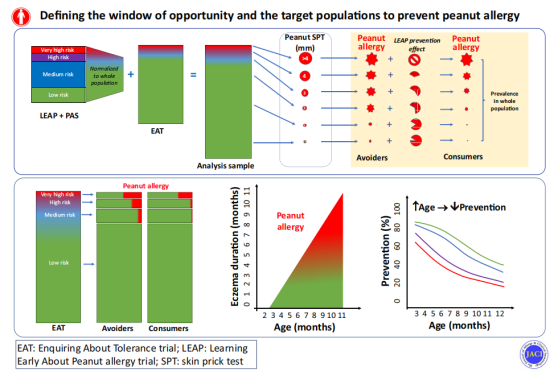JACI:確定預(yù)防花生過敏的機會窗口和目標人群
發(fā)布日期:2023-06-01
原標題:確定預(yù)防花生過敏的機會窗口和目標人群
——浙大迪迅 譯
背景:花生過敏影響1%~2%的歐洲兒童。在飲食中盡早引入花生可以減少高危嬰兒的過敏。
目的:旨在確定花生產(chǎn)品的最佳目標人群和引入時間,以預(yù)防普通人群中的花生過敏。
方法:來自耐受性詢問的數(shù)據(jù)(EAT; n = 1303;正常風(fēng)險;3年隨訪;ISRCTN14254740)、早期了解花生過敏研究(LEAP; n = 640;高風(fēng)險;5年隨訪;NCT00329784)和花生過敏隨機對照試驗(PAS; n = 194;低風(fēng)險和極高風(fēng)險;5年隨訪)觀察性研究用于模擬一般人群的干預(yù)?;ㄉ^敏的定義是盲法花生激發(fā)試驗或診斷性皮膚點刺試驗結(jié)果。
結(jié)果:僅針對患有嚴重濕疹的高危嬰兒,人群疾病負擔(dān)僅減少4.6%。當(dāng)僅針對較大但風(fēng)險較低的人群進行干預(yù)時,花生過敏的減少幅度最大。當(dāng)花生被引入所有嬰兒的飲食中時,4個月患有濕疹和6個月沒有濕疹的嬰兒的花生過敏率估計降低了77%?;ㄉ^敏的估計減少隨著每個月延遲引入而減少。如果引入延遲到12個月,花生過敏只會降低33%。
結(jié)論:早期將花生制品引入飲食的預(yù)防效果隨著引入時年齡的增加而降低。在花生過敏是公共衛(wèi)生問題的國家,衛(wèi)生保健專業(yè)人員應(yīng)幫助父母在嬰兒4至6個月大時將花生產(chǎn)品引入其飲食中。

原始出處
JACI
[IF:14.29]
Defining the window of opportunity and target populations to prevent peanut allergyDOI: 10.1016/j.jaci.2022.09.042
Abstract:
Background: Peanut allergy affects 1% to 2% of European children. Early introduction of peanut into the diet reduces allergy in high-risk infants.
Objectives: We aimed to determine the optimal target populations and timing of introduction of peanut products to prevent peanut allergy in the general population.
Methods: Data from the Enquiring About Tolerance (EAT; n 5 1303; normal risk; 3-year follow-up; ISRCTN14254740) and Learning Early About Peanut Allergy study (LEAP; n 5 640; high risk; 5-year follow-up; NCT00329784) randomized controlled trials plus the Peanut Allergy Sensitization (PAS; n 5 194; low and very high risk; 5-year follow-up) observational study were used to model the intervention in a general population. Peanut allergy was defined by blinded peanut challenge or diagnostic skin prick test result.
Results: Targeting only the highest-risk infants with severe eczema reduced the population disease burden by only 4.6%. Greatest reductions in peanut allergy were seen when the intervention was targeted only to the larger but lower-risk groups. A 77% reduction in peanut allergy was estimated when peanut was introduced to the diet of all infants, at 4 months with eczema, and at 6 months without eczema. The estimated reduction in peanut allergy diminished with every month of delayed introduction. If introduction was delayed to 12 months, peanut allergy was only reduced by 33%.
Conclusions: The preventive benefit of early introduction of peanut products into the diet decreases as age at introduction increases. In countries where peanut allergy is a public health concern, health care professionals should help parents introduce peanut products into their infants’ diet at 4 to 6 months of life.
First Author:
Graham Roberts
Correspondence Author:
Gideon Lack
Correspondence:
Children’s Allergy Service, 2nd Floor, Stairwell B, South Wing, Guy’s and St Thomas’ NHS Foundation Trust, Westminster Bridge Rd, London SE1 7EH, United Kingdom.
E-mail: gideon.lack@kcl.ac.uk.
 杭州浙大迪迅生物基因工程有限公司
杭州浙大迪迅生物基因工程有限公司

